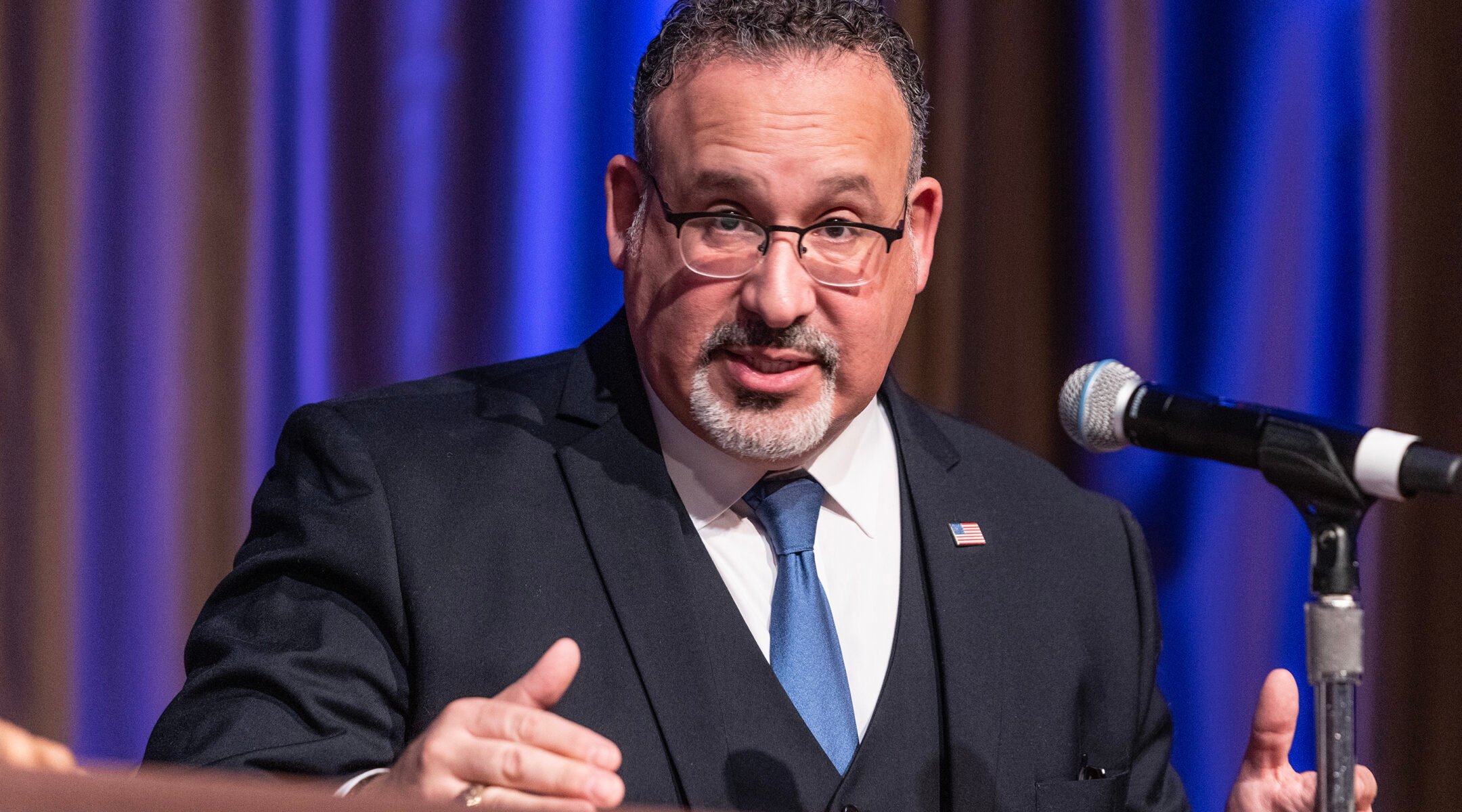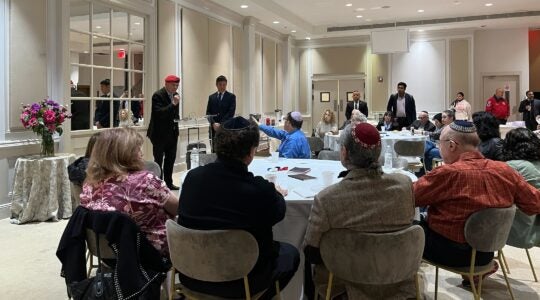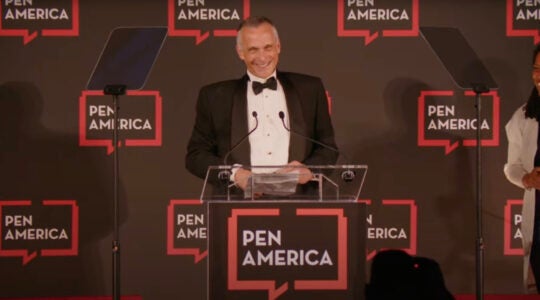(JTA) — A Jewish college student recently told Miguel Cardona that he believed antisemitism has become “normalized” on campuses. For the secretary of education, the comment stuck.
“That, to me, was repulsive,” Cardona told the Jewish Telegraphic Agency Wednesday. “As a father that really got to me, that there’s a student that thinks antisemitism is normalized and treated differently. And that was even before the attacks.”
Since the Oct. 7 Hamas attack on Israel, of course, antisemitism on college campuses has only more forcefully drawn public attention. The heads of three elite universities appeared to downplay the matter during a congressional hearing last month; two have since resigned amid the fallout. The Department of Education’s Office of Civil Rights has opened dozens of investigations into allegations of discrimination at universities and K-12 schools since Oct. 7, and while it does not reveal many public details about them, JTA has confirmed that many involve reports of antisemitism or Islamophobia.
Speaking to JTA Wednesday following a conversation with Jewish and Muslim students at Dartmouth College, Cardona said his department was taking steps to deal with the problem. He also praised the efforts of Dartmouth, which has been celebrated in the media for its attempts to host sessions bridging the gap between pro-Israel and pro-Palestinian students — an effort that the school formalized on Thursday with the announcement of “Dartmouth Dialogues.” And he defended oft-criticized Diversity, Equity, and Inclusion offices, saying that Jewish students should be able to think of them as resources.
Here is what Cardona told JTA about how his department is handling the problem.
JTA: You just spoke to Jewish and Muslim students at Dartmouth about antisemitism and Islamophobia on campus. What did you learn from them?
Cardona: I learned that we’re able to create safe learning environments while also giving students an opportunity to express themselves. I learned that the more you engage students in problem solving, the more likely it’s going to be successful. And what I learned also is that you need a culture and a climate on campus that is willing to engage in problem-solving when conflicts arise. They have that at Dartmouth. It was there before Oct. 7. And clearly it’s part of the reason why they’re finding success.
You have spoken about how antisemitism and Islamophobia on campus have been problems since Oct. 7. How do you understand this problem at this moment, and how can the department address it?
I said that it’s been a problem before Oct. 7. As a matter of fact, it’s been getting increasingly worse even before the Oct. 7 attacks — to the point where I had a student when I visited Towson University, a Jewish student, who told me that he believes that it’s become normalized in our country to kind of brush aside antisemitism, more so than any other form of hate and discrimination. That to me was repulsive. As a father that really got to me, that there’s a student that thinks that antisemitism is normalized and treated differently. And that was even before the attacks.
I think this is an opportunity for colleges to stand up forcefully in protecting the safety of students on campus. I don’t want any Jewish students to feel like they have to hide symbols of their faith because of what’s happening on campus. I don’t want any student to feel that they have to hide their identity to be successful on campus.
We’ve released Dear Colleague letters, which are basically letters of guidance to the field, to make sure that they know their responsibility under Title VI to keep students safe. But even more fundamental than that, I think we’re at a point now where we have to be very direct, that students should not have to hide their identity or be ashamed of who they are or hide who they are on our college campuses. And it’s the responsibility of college presidents to act very clearly and unambiguously that student safety is their priority and that they’re going to listen and make sure that students feel that it’s taken seriously.
You mentioned Title VI investigations. Your department has opened close to 50 such investigations since Oct. 7. Many of them involve antisemitism. How do you choose what to investigate?
The decisions on how to investigate are made by the Office for Civil Rights. When they have the request, they look at them very carefully. A lot of folks don’t know this, but it’s important to note that the investigation requests, when accepted, open up an investigation [that is] very thorough. Students are spoken to and listened to, and it could even uncover something that wasn’t in the original investigation request.
We’ve opened over 45 in three months, which is almost double what was opened in four years in the last administration, which is testament that we take this very seriously. We take these threats and these beliefs of students of being unsafe on campus very seriously, and we’re going to thoroughly investigate them.
In the past, it took patterns of misbehavior before many Title VI investigations would be opened. Now some are being opened over single isolated incidents. Why?
Again, we recognize how important safety is on campus. And while we might open these cases, it doesn’t necessarily assume that the investigation is going to find Title VI violations. But we are committed to ensuring, through our enforcement arm, that we are sending the message and investigating, thoroughly, issues that lead to student safety concerns on campus.
You mentioned how many investigations there are. I imagine that takes a lot of resources. Are you directing more departmental resources to Title VI, or to other ways of combating antisemitism?
Absolutely. First of all, I think it’s really important that I share with you: In November, I asked Speaker of the House [Mike] Johnson for additional funding for the Office for Civil Rights. We had 10,000 complaints in 2019 lodged to the Department of Education Office for Civil Rights. We had 19,000 in 2022. So we’re fighting for additional dollars there, instead of cuts, to the Office of Civil Rights.
But, you know, we’re also not going to change culture through memos, or through investigations. We are just as passionate, and just as urgent, on developing resources, guidance, exemplars, technical assistance mechanisms for universities. We’ve visited dozens of universities, members of our team. We’ve met with attorneys, we met with college presidents. You’ll see on our website a list of dozens of resources for campuses. My visit today to Dartmouth was to see for myself and hear from students myself, on what works, so that we could lift up best practices across the country.
So yes, we’re going to enforce and we’re unapologetic about them. But we’re also going to build capacity and give universities tools that we know work in other places to create safe learning environments where students could oppose, have different beliefs, but do so civilly. At the end of the day student safety is our No. 1 priority.
If you look at the Department of Education, what we’ve done since Oct. 7, you won’t find another administration that has come close to the work that we’ve done not only to investigate, but also to build capacity on campuses to create safe learning environments.
An official in your department, Tariq Habash, recently resigned over what he said was your failure to protect students who nonviolently advocate for Palestinians. How do you respond to the charge that doing what you do is actually chilling free speech on campus?
I wish Tariq well. He was a valued member of our team. And what I will tell you is the work that we’ve done at the Biden-Harris administration, and in particular at the Department of Education, around protecting students, including students who are feeling threatened with antisemitism, we’ve done more than any other administration. We’re going to continue to do it. Student safety for me is not something that we go light on, we have to make sure we’re clear on it.
We need to be very clear with college presidents that it’s our expectation that when students are feeling unsafe, they are responding to students right away. And that they’re taking it very seriously.
A lot of university administrators seem to have been slow to acknowledge that there is a problem. What are you actually able to compel administrations to do for Jewish students?
I think you’re right. I think that if there’s a lack of visibility from the leadership, it’s more likely that students are going to find unsafe ways to channel their frustrations. What we saw today at Dartmouth was when students are given an opportunity, because leadership owns the responsibility and acts on it, to create a safe learning environment and to listen to students.
I’ve been very clear from day one, calling out college presidents in terms of their responsibility to address this issue head on. We’ve not only provided accountability, but we’ve provided a lot of resources. I have my team ready to pick up the phone for any leader that is struggling with this and needs guidance and support. We have a technical assistance team that has been assembled. We have done numerous webinars, we’ve traveled to college campuses. We’ve engaged with the Muslim Jewish Advocacy Center in New York City and worked with them to help them serve as almost mentors to colleges and to K-12 district leaders. So we’re really modeling what we want to see from college leaders.
The student that told me that in this country he feels like we’ve normalized antisemitism: that message really resonated with me, and it upset me, to the point where, if that were my child, I would not feel comfortable wanting to send my child to a campus far away. I want for that child what I would want for my own child, and that’s leadership that’s willing to stand up on the values that we have in this country that students should be safe on campus.
A lot of critics of the rise of DEI programs have said that this is actually contributing to a hostile rhetoric for Jews in schools because Jews are not always included as part of the curricula, or they’re painted as oppressors in some of these frameworks. How do you think about the role of DEI in this problem?
I think in so many places across the country, we see DEI efforts reduced to just Black and brown issues. And as a Latino but also as an education leader, I think that’s unfortunate. We need to look at Diversity, Equity, Inclusion as a place where conversations about religious identity or difference of opinions could be handled respectfully and civilly, like what I saw today on Dartmouth’s campus.
I think it’s unfortunate if they’re being viewed as anything but the right place to go when there are issues of inclusion or safety or belonging that plague our universities. I think a well-developed DEI model includes opportunities for students to share the frustrations or concerns that they have on campus, relative to how they might be feeling with regard to antisemitism, Islamophobia or anti-Arab sentiment.
We’ve heard from Jewish parents who are now saying that, since Oct. 7, they’ve become uncomfortable with the idea of sending their children to some of these universities because the climate of antisemitism there has gotten so bad. What would you say to them?
My heart goes out to those parents and it’s frustrating as secretary of education to hear that, in 2024, that is the case. What I would tell those parents is that they have the right to discuss with the leadership of the university their feelings, because, quite frankly, parents can decide where they send their children. And it would be a disservice, not only to the students who are of Jewish descent, but to all students, to have a university whose membership is limited based on feelings of antisemitism by some of the students. Students learn best in a diverse learning environment. Students learn best when they can be on campus, unapologetic of who they are. And I wouldn’t want Jewish students to not feel comfortable expressing who they are, their feelings, even if it’s in disagreement with some other students on campus.
Those parents have the right, and those universities have the responsibility to ensure to those parents, that their students are going to learn in a safe learning environment and that there are resources on campus, not only for the students to go if they feel unsafe, but also where those students could go to express their pride in their culture and their religious background and in their ancestry.
JTA has documented Jewish history in real-time for over a century. Keep our journalism strong by joining us in supporting independent, award-winning reporting.






